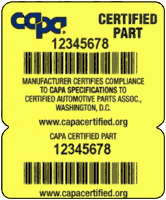Certified Automotive Parts Association

The Certified Automotive Parts Association (CAPA) is a non-profit organization established in 1987 and based in Washington, DC, United States, to develop and oversee a test program guaranteeing the suitability and quality of automotive parts. CAPA encourages competition in the marketplace in the hope that their program will ultimately reduce expense to the consumer and the industry while increasing and assuring part quality.
Material Standards
CAPA quality standards apply to various types of parts made from different materials. CAPA is constantly expanding the certification program to include more parts and new materials. Currently, three specifications that set quality standards for metal (CAPA 101), plastic (CAPA 201) and lighting (CAPA 301) are in place. Each specification provides detailed testing and inspection procedures to ensure the quality of the parts covered by that specification. Where possible, all test procedures refer to the nationally recognized tests such as those of ASTM and SAE.[1]
Metals (CAPA 101)
Metal parts that are primed, decoratively painted, plated with metallic coatings, or painted and plated with metallic coatings are covered, including:
- Bezels
- Deck lids
- Door shells
- Fenders
- Grilles
- Hoods
- Pickup beds
- Pickup box sides
- Quarter panels
- Radiator supports
- Wheel houses
- Tailgates
Plastics (CAPA 201)
Plastic parts that are unprimed, primed, decoratively painted, plated with metallic coatings, or painted and plated with metallic coatings are covered, including:
- Bezels
- Bumper Covers
- Fenders
- Fascias, Front/Rear
- Grilles
- Header Panels
- Hoods
- Side Mouldings
The CAPA 201 specifications include requirements for:
- Adhesive integrity
- Appearance
- Assembly requirements
- Coating performance
- Dimensional Checks
- Fasteners
- Hardware
- Materials analysis (composition, mechanical properties)
- Production requirements
- Quality control procedures
- New Part Approval Vehicle Test Fit (VTF), as applicable
Lighting (CAPA 301)
CAPA 301 for Lighting was approved by the CAPA Technical Committee in March 2002. Automotive lighting parts are covered, including:
- Headlamps
- Taillamps
- Side Markers
- High-Mounted
- Brake Lights
The CAPA 301 specifications include requirements for:
- FMVSS 108 Compliance, Initial and Ongoing
- Dimensional Verification
- Physical Dimensions and Effective Projected Luminous Lens Area
- Electrical and Power
- Illumination, Photometry, and Color
- Life and Durability Requirements
- Gaskets, Adhesives, Sealants, and Auxiliary Equipment
- Aiming Devices
- Metallurgical/Material Analyses (composition, mechanical properties)
- Appearance
- Production
- Quality Control Procedures
- New Part Approval Vehicle Test Fit (VTF)
See also
References
- ↑ "Overview of CAPA". Retrieved 2 June 2013.